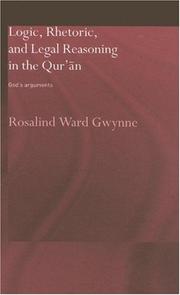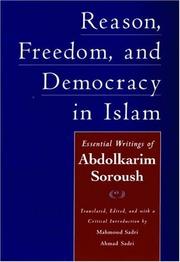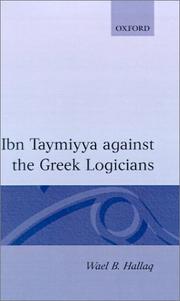| Listing 1 - 4 of 4 |
Sort by
|

ISBN: 0415324769 9780415324762 0415554195 9780415554190 Year: 2004
Abstract | Keywords | Export | Availability | Bookmark
 Loading...
Loading...Choose an application
- Reference Manager
- EndNote
- RefWorks (Direct export to RefWorks)
"Muslims have always used verses from the Qur'an to support opinions on law, theology, or life in general, but almost no attention has been paid to how the Qur'an presents its own precepts as conclusions proceeding from reasoned arguments. Whether it is a question of God's powers of creation, the rationale for his acts, or how people are to think clearly about their lives and fates, Muslims have so internalized Qur'anic patterns of reasoning that many affirm that the Qur'an appeals first of all to the human powers of intellect." "This book provides a new key to both the Qur'an and Islamic intellectual history. Examining Qur'anic argument by form and not content helps readers to discover the significance of passages often ignored by the scholar who compares texts and the believer who focuses upon commandments, as it allows scholars of Qur'anic exegesis, Islamic theology, philosophy, and law to tie their findings in yet another way to the text that Muslims consider the speech of God."--Jacket.
Islam and reason --- Koranic teaching --- Qur'an and philosophy --- Intellect --- Religious aspects --- Islam --- 11.81 Koran. --- Argumentation. --- Coran et philosophie. --- Faith and reason --- Intelligence --- Islam et raison --- Islamitisch recht. --- Islamitische filosofie. --- Koran. --- Logica. --- Logik. --- Qurʼan and philosophy. --- Rhetorik. --- Qurʼanic teaching. --- Aspect religieux --- Enseignement coranique. --- Qurʼan.

ISBN: 0199880875 1280472049 0195351916 1423760328 9780195351910 9781423760320 9781280472046 9786610472048 6610472041 9780195128123 0195128125 0195128125 9780195158205 0195158202 0197740685 Year: 2000 Publisher: New York (N.Y.) : Oxford University Press,
Abstract | Keywords | Export | Availability | Bookmark
 Loading...
Loading...Choose an application
- Reference Manager
- EndNote
- RefWorks (Direct export to RefWorks)
"In recent years 'Abdolkarim Soroush has emerged as one of the leading revisionist thinkers of the Moslem world. Supporters and critics alike have called him the Martin Luther of Islam - a man whose ideas on religion and democracy could bridge the chasm between Moslem societies and the rest of the world. Soroush and his contemporaries in other Moslem countries are shaping what may become Islam's equivalent of the Christian Reformation: a period of questioning traditional practices and beliefs and, ultimately, of upheaval." "This book features eleven of Soroush's essays translated into English for the first time, a new critical introduction by the editors, and an original interview that reveals the intellectual biography of Soroush. Offering a timely corrective to the common view of Islam as monolithically reactionary, this book will be of great interest to students and scholars of the Middle East and Islam and politics both here and abroad."--Jacket.
Faith and reason --- Liberty --- Democracy --- Islam and state. --- Mosque and state --- State and Islam --- State, The --- Ummah (Islam) --- Freedom (Islam) --- Faith and reason (Islam) --- Islam and reason --- Islam. --- Religious aspects --- Islam and state --- Islam --- Faith and reason - Islam --- Liberty - Religious aspects - Islam --- Democracy - Religious aspects - Islam --- Démocratie --- Foi et raison --- Islam et philosophie. --- Islam et raison. --- Islam et État. --- Liberté (islam). --- Liberté --- Politieke aspecten. --- Aspect religieux --- Islam and reason.
Book
ISBN: 9781848850613 1848850611 Year: 2011 Volume: 5 Publisher: London I.B. Tauris
Abstract | Keywords | Export | Availability | Bookmark
 Loading...
Loading...Choose an application
- Reference Manager
- EndNote
- RefWorks (Direct export to RefWorks)
Since the earliest period of Islamic history, Arab thought and reason has been dominated by a reverence for tradition and textual analysis. In this groundbreaking work, the great contemporary Arab philosopher Mohammed Abed al-Jabri seeks to chart a course towards modernity via the proposition that respect for textualism and tradition are not inconsistent with rationalism, and that both history and philosophy are key to the evolution of knowledge systems and ways of reasoning in Arab culture. Al-Jabri dissects the systems through which knowledge is obtained and verified in Arab thought, and demonstrates their fundamental bias towards analogical reasoning and premodern authoritative referents, some of which are inherently resistant to empirical analysis. In an impassioned defence of rationalism, he argues that these textual reference points must be interpreted and mediated with critical analytical tools. He advocates an evolution of Arab thought to accommodate the changeability of values, interpretations and structures over space and time, to escape an a-historical imprisonment. Since the earliest period of Islamic history, Arab thought has been dominated by a reverence for tradition and textual analysis. In this groundbreaking work, the great contemporary Arab philosopher Mohammed Abed Al-Jabiri seeks to chart a route towards modernity via the proposition that respect for textualism and tradition are not inconsistent with rationalism and that both history and philosophy are key to the evolution of knowledge systems and ways of reasoning in Arab culture. This book has been an enormous influence within the Arab world on the 'Islam and Modernity' discourse. It is published here for the first time in English and provides a fascinating insight into the currents of contemporary Arab thought.
Philosophy, Arab --- Islam and philosophy. --- Islam and reason --- Islamic modernism. --- Philosophie arabe --- Islam et philosophie --- Islam et raison --- Modernisme islamique --- History. --- Histoire --- Faith and reason -- Islam. --- Philosophy, Arab -- History. --- Islam and reason. --- Islamic modernism --- Islam and philosophy --- History --- Philosophy, Arab - History --- Philosophy, Arab - 20th century --- Faith and reason --- Islam --- 165.63 --- 1 <=927> --- Modernism, Islamic --- Faith and reason (Islam) --- Philosophy and Islam --- Philosophy --- Arab philosophy --- Arabic philosophy --- Philosophy, Arabic --- 1 <=927> Arabische, islamitische filosofie --- Arabische, islamitische filosofie --- 165.63 Rationalisme. Intellectualisme. Aufklärung. Verlichting. Enlightenment --- Rationalisme. Intellectualisme. Aufklärung. Verlichting. Enlightenment

ISBN: 0198240430 9780198240433 0191680176 Year: 1993 Publisher: Oxford Clarendon
Abstract | Keywords | Export | Availability | Bookmark
 Loading...
Loading...Choose an application
- Reference Manager
- EndNote
- RefWorks (Direct export to RefWorks)
Islam and reason --- Islam --- Logic --- Logic, Medieval. --- Early works to 1800. --- Doctrines --- -Islam --- -Logic --- -Logic, Medieval --- Medieval logic --- Argumentation --- Deduction (Logic) --- Deductive logic --- Dialectic (Logic) --- Logic, Deductive --- Intellect --- Philosophy --- Psychology --- Science --- Reasoning --- Thought and thinking --- Mohammedanism --- Muhammadanism --- Muslimism --- Mussulmanism --- Religions --- Muslims --- Early works to 1800 --- -Early works to 1800 --- Methodology --- Faith and reason --- Islam et raison --- Logique médiévale. --- Logique --- Philosophie islamique --- Griekse oudheid. --- Islam. --- Logica. --- Ouvrages avant 1800. --- Influence grecque --- Sources. --- Ibn Taymiyyaẗ, Aḥmad ibn ʻAbd al-Ḥalīm Taqī al-Dīn --- Critique et interprétation. --- Ibn Taymiyyaẗ, Aḥmad ibn ʻAbd al-Ḥalīm Taqī al-Dīn, --- Logic, Medieval --- Faith and logic --- Logic and faith --- Reason --- Reason and faith --- Reason and religion --- Religion and reason --- Religious aspects --- Islam and reason - Early works to 1800. --- Islam - Doctrines - Early works to 1800. --- Logic - Early works to 1800
| Listing 1 - 4 of 4 |
Sort by
|

 Search
Search Feedback
Feedback About UniCat
About UniCat  Help
Help News
News